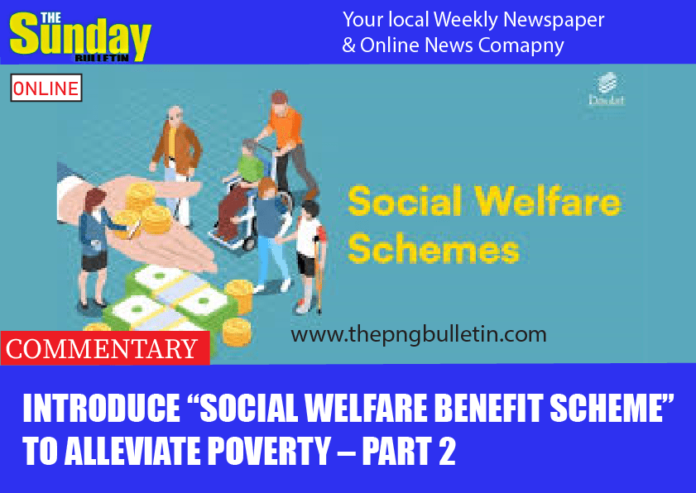By CHRISTOPHER PAPIALI
IN my previous article ran by this digital media platform (Sunday Bulletin) I discussed in brief Social Welfare Benefit Scheme (SWBS) that the government of Papua New Guinea can institute to reduce poverty and provide an enabling environment in the SME space.
This is the second part to that piece. In this part I want to discuss certain key factors that can be considered in implementing the SWBS.
The first consideration is to make sure everyone has a National Identification Card (NID Card) through the PNG Civil and Identity Registry. Everyone’s data that includes age, place of birth, gender, marital status, province of origin, village, LLG, etc… have to be stored in the database for easy access and regular updates.
The second consideration is that all citizens must open their bank accounts with any commercial banks with valid names and IDs. And it is advisable for everyone to have their bank cards.
And the third is the establishment of the SWBS secretariat or management office within the National Planning, Treasury or Finance Department.
Let us now look at the three areas in detail.
The SWBS Secretariat will manage, monitor and evaluate their functions in partnership with relevant key agencies that are involved in the SWBS. One of objectives is to establish provincial and district offices so that people in the towns and rural areas can access information and raise issues that confront them relating to card loss, deaths, transfers, and related queries.
It is crucial that anyone who has died cannot be allowed to access the SWBS. It is the work of the village councillor or Village Recorder or the LLG President to inform the SWBS Secretariat so that funds can be ceased.
In the case of transfers where a person leaves the village or town area and to settle in another location the transfer information whether be due to work, marriage, etc… have to be passed to SWBS for consistency. And this also applies to people who may decide to leave PNG for other countries.
The SWBS Secretariat needs to develop stringent policies relating to people who misuse the funds. There may be cases where youths are always drinking alcohol with the funds. In such scenarios such youths would be penalised where they will not receive funds after a second or third warning from the authorities. The power to make such a decision has to be collective in which parties shall include police, LLG President, Ward Councillor, Church Representative and SWBS representative.
The SWBS office in the LLGs, districts or provincial centres need to have up-to-date data in those respective provinces so that the outcome of the SWBS is measured which forms a significant part of the MTDP process.
The NID Card is a requirement to access the SWBS. But for those working class and others the secondary category of requirement list could include Driving License, Passports, and Employment ID.
Each citizen is to have their own personal bank accounts to monitor funding use and progression. Dual signatories to the accounts cannot be established. However, on certain occasions where families decide to have only one operational account that has parents having primary signatures then that can be allowed but with certain strict rules of SWBS.
Some of you are asking, will this be successful and how is it going to work?
My answer to that is simple. The national government through partnership with key humanitarian organisations need to develop a coherent structural framework of the SWBS. Positions and functions of SWBS must be clearly spelt out without any residuals and redundancies. The officers need to sign an oath with ICAC or Transparency International as they will be involved with funds and people’s lives.
It is critical for the officers of SWBS to be grassroots focused. This means they have to be regularly meeting village councillors, LLG Presidents, Church leaders, etc… to monitor the progression of the funds, and how people are using them. These officers need to encourage the community to participate in any SME activities that benefit the community that could include addressing Gender Based Violence activities, sewing classes, chicken projects, piggery, fish ponds, agriculture, etc…
If you can recall in the first discussion, I highlighted that many of our village people will not depend on their local MPs for funds to empower them but will significantly move away from the attention of the MPs. This will enable local MPs and provincial governors to concentrate on mega projects like road constructions, classrooms, etc… Not only that, with the money mothers can look after the basic needs of their families.
If you can look at this very seriously, the SWBS is really a mouth-to-mouth resuscitation program that not only looks at empowering our people but improving the GDP of the country. This program is in line with what is embarked on in the fixation strategies of the United Nations.
The SWBS is a revolutionary program that we can consider in the 50 Years of Nationhood. This program decimates the dependency syndrome. Take my word…. SWBS will cultivate social integration, participation, and profit from every margin of the PNG cultural communities.

